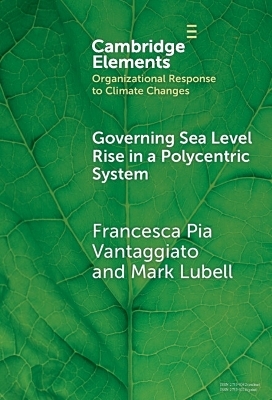
Governing Sea Level Rise in a Polycentric System
Easier Said than Done
Seiten
2024
Cambridge University Press (Verlag)
978-1-009-47594-5 (ISBN)
Cambridge University Press (Verlag)
978-1-009-47594-5 (ISBN)
This Element combines the literature on adaptation planning with the Ecology of Games framework to investigate how policy actors address the collective action problems of climate adaptation: the key barriers they perceive, their collaborative relationships and their assessment of the policy forums they attend.
How do polycentric governance systems respond to new collective action problems? This Element tackles this question by studying the governance of adaptation to sea level rise in the San Francisco Bay Area of California. Like climate mitigation, climate adaptation has public good characteristics and therefore poses collective action problems of coordination and cooperation. The Element brings together the literature on adaptation planning with the Ecology of Games framework, a theory of polycentricity combining rational choice institutionalism with social network theory, to investigate how policy actors address the collective action problems of climate adaptation: the key barriers to coordination they perceive, the collaborative relationships they form, and their assessment of the quality of the cooperation process in the policy forums they attend. Using both qualitative and quantitative data and analysis, the Element finds that polycentric governance systems can address coordination problems by fostering the emergence of leaders who reduce transaction and information costs. Polycentric systems, however, struggle to address issues of inequality and redistribution.
How do polycentric governance systems respond to new collective action problems? This Element tackles this question by studying the governance of adaptation to sea level rise in the San Francisco Bay Area of California. Like climate mitigation, climate adaptation has public good characteristics and therefore poses collective action problems of coordination and cooperation. The Element brings together the literature on adaptation planning with the Ecology of Games framework, a theory of polycentricity combining rational choice institutionalism with social network theory, to investigate how policy actors address the collective action problems of climate adaptation: the key barriers to coordination they perceive, the collaborative relationships they form, and their assessment of the quality of the cooperation process in the policy forums they attend. Using both qualitative and quantitative data and analysis, the Element finds that polycentric governance systems can address coordination problems by fostering the emergence of leaders who reduce transaction and information costs. Polycentric systems, however, struggle to address issues of inequality and redistribution.
1. Introduction: climate adaptation and collective action; 2. Sea level rise adaptation as a new collective action problem; 3. Climate adaptation barriers in polycentric systems; 4. Policy networks for cooperation and learning; 5. Sea level rise adaptation games; 6. Implications and agenda for future research; Appendix; References.
| Erscheinungsdatum | 13.04.2024 |
|---|---|
| Reihe/Serie | Organizational Response to Climate Change: Businesses, Governments |
| Zusatzinfo | Worked examples or Exercises |
| Verlagsort | Cambridge |
| Sprache | englisch |
| Maße | 158 x 235 mm |
| Gewicht | 300 g |
| Themenwelt | Naturwissenschaften ► Biologie ► Ökologie / Naturschutz |
| Naturwissenschaften ► Geowissenschaften ► Meteorologie / Klimatologie | |
| Technik ► Bauwesen | |
| ISBN-10 | 1-009-47594-0 / 1009475940 |
| ISBN-13 | 978-1-009-47594-5 / 9781009475945 |
| Zustand | Neuware |
| Informationen gemäß Produktsicherheitsverordnung (GPSR) | |
| Haben Sie eine Frage zum Produkt? |
Mehr entdecken
aus dem Bereich
aus dem Bereich
Grundlagen, Systeme, Anwendung, Wirtschaft
Buch | Hardcover (2024)
Carl Hanser (Verlag)
CHF 139,95


